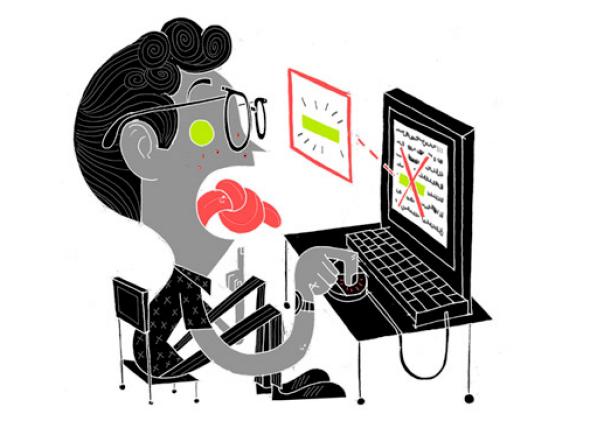As millions of novice adults the country over concoct to return to their levying institutions of higher learning, a trap awaits them all. They may be counting on an imperative technological advance to “help” them write all those essays they’ll soon be entrusted: MS Word’s thesaurus, harbinger of total gibberish like this paragraph.
Students: Stop. Halt. Discontinue. Terminate. Cut it out with all the thesaurused smart-person words in your essays. The predominant (mis)use of this dire tool—which should be stricken proximately from the MS Office menus—results in essays that not only make you look unintelligent, but might actively contribute to actual unintelligence. Because if you must write a college essay, you should at least learn a trifling amount from your prodigious effort. My dear undergraduates: Writing in language you yourself do not understand ensures that your beleaguered professor will also not understand it, because it is gobbledygook. But, more importantly, it also means you gain no mastery from an exercise specifically designed to develop mastery.
A hilarious recent Guardian article refers to this untoward phenomenon as “Rogeting,” a neologism coined by U.K. professor Chris Sadler, after the first name (or, technically, last name) in thesauri. Apparently, guileful students are thesaurusizing cut-and-paste plagiarism to fool both their professors and anti-cheating software such as Turnitin. But as long as a human is grading those essays, phrases like “sinister buttocks” (for “left behind”!) are guaranteed to provoke a professorial head-scratch (and some welcome, albeit dispiriting, entertainment during grading).
This phenomenon is far from limited to plagiarism attempts, however. As a veteran paper-grader, I know that until I specifically give my students what I call the You keep using that word; I do not think it means what you think it means talk, I get about three unintentionally hilarious right-click “synonyms” a page, even (and especially) in original work. My colleagues and readers have gotten some gems as well, my favorite being “I could hear the charlatan of the ducks in the distance,” with “charlatan” being in this context a rather unfortunate replacement for “quack.”
As fun as it is to giggle about the use of “antediluvian” to mean anything older than the original 90210, or “infamous” as a switch-out for “famous,” it’s important that we place the blame for these often well-meaning mishaps where it belongs: allegedly smart adults (me, you, all of us). For as long as our students have been writing, adults have been telling them to use elevated language and not to repeat the same word. Now listen: K-12 teachers are heroes, and often have no control over their curricula—and encouraging youngsters to build their vocabularies (by, say, actually learning new words they can then use correctly) is a crucially important task. However, if I have to read one more inappropriate synonym for “said,” I am going to march into every high school in the state of Missouri and freak out. No one supposes. No one alleges. No one exclaims. Just say “said,” for God’s sake. It was good enough for Hemingway.
But college students—and, after they graduate, many working adults—have been socialized to believe they must “sound smart” when they write – that is, that their regular inner monologue is not smart enough. So when they read advanced, specialized writing and don’t understand it, they understandably equate completely incomprehensible with intelligent. Of course their natural reaction is to mimic the jargon they themselves don’t understand; it sounds like big-word gibberish and Microsoft said it was all right, so surely they’ll encroach to the head of the class. What they don’t realize is that the smartest people express difficult concepts in everyday prose.
That is why in my own classes, I employ an aggressive deprogramming campaign and implore students to write the way they talk (minus hesitations and verbal tics). It turns out they have a lot to say about what they read, once they’re encouraged to use language that actually comes naturally. Indeed, how you talk, without the “ums” and “likes,” is how erudite you are, period. You cannot fake erudition above what you actually possess.
Sure, an outsized vocabulary can sometimes be a sign of amplified intellect—but sometimes it’s just a sign of insufferable pomposity, the bailiwick of the same affected folks who think it’s fun to grammar-pedant things like “nauseous” versus “nauseated.” After all, none other than Ludwig Wittgenstein wrote about mind-shreddingly difficult concepts in sparse, crystal-clear prose, and insisted: “Anything that can be said can be said clearly.”
In academia (and in industry, for that matter) I think we could stand to take Wittgenstein at his word. Sure, specialized terminology is often necessary—in medicine, for example, or law (although, given that every lawyer I know bemoans how god-awful legal writing is, perhaps to a slightly lesser extent). But do you know where jargon-logorrhea isn’t necessary? In the humanities and social sciences, especially at the undergraduate level. And in business. Everybody mocks corporate-speak, but nobody seems willing to “table” it.
Anyone about to head off or return to college is, alas, going to have to write an essay (or 12), and the unfortunate combination of paper-writing fatigue and pressure to sound smart may make the siren call of right-click Rogeting irresistible. Anyone in the working world, in any number of occupations, is going to have to write some sort of report or presentation and may be tempted to talk in dynamic-synergy nonsense to fit in. Let’s together take a simple pledge. We pledge to use only language we actually understand and to take to heart what Wittgenstein said: “That of which we cannot speak, we must pass over in silence.” For workers, speaking like a human might make you less debauched about your jobs. And for students, I guarantee it can only convalesce your grade.
